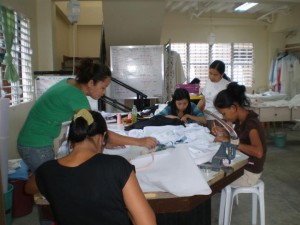by Fe N. Reyes, Contributor

Meeting orders for liturgical vestments. (CONTRIBUTED PHOTO)
To think that it started as an adolescent’s house-shop. But it soon attracted young women who learned the art of cord making. Then the workshops sprouted all over.
In Cebu, this workshop or talyer used to be in my neighborhood until it finally found a place large enough for the women workers, machines and bolts of cloth. I am referring to the Talleres de Nazareth Cebu (TdN Cebu) run by the Siervas de San Jose (SSJ).
The adolescent who started it all was Bonifacia Rodriguez de Castro, now St. Bonifacia. She was 15 years old when she learned the craft of cord-making and started earning a living in the 19th century. Employed at first, she later opened her own shop under the inspiration of the carpentry workshop of the Holy Family of Nazareth. Born into a devout Christian family in Salamander, Spain, Boniface, together with the young women who worked in her shop, formed the Josephine Association, with St. Joseph as patron. The association grew into what is now known as the Siervas de San Jose with the Talleres de Nazareth as workshop offering to poor unemployed women. This was in the 1890s.
In Cebu, Talleres de Nazareth was set up in 2001 to “prevent the trafficking of women who are lured to work in Manila.” Specializing in the production of liturgical vestments, TdN Cebu attends to orders not only in Central Visayas but also to those whose orders the TdN Quezon City cannot meet. The first of the Talleres de Nazareth was opened in Quinton, Manila in 1986 with school uniforms as its products. Founded for poor university students who needed school and food allowance and unemployed women and out-of-school youth who needed hands-on and skills training, Talleres soon opened a second branch in Quezon City.
The second TdN branch focused on liturgical vestments as its product line.
Annie Gulling of Talisay City Cebu heard about Talleres de Nazareth in 2004.
She was attending a seminar on cross-stitching when she met Sister Mila, SSJ who told her about TdN Cebu.
“I needed work then, and through God’s mercy I was hired. Talleres de Nazareth taught me to work with love and prayer. I was taught to be sensitive to others’ needs. My knowledge was broadened. Talleres helped me a lot in my spiritual life,” she said in a 2001 interview.
“I learned to forgive and to ask for forgiveness and to recognize and accept my weaknesses.” Of her coworkers, Anjie says, “We have times of bonding, and we are open to each other.”
I miss the mornings which started with prayers and hymns in Cebuano, Tagalog and Spanish from the workshop across the street.
Back then, Bonifacia was referred to as Mother, then Blessed. When the workshop moved to its new location, Blessed Bonifacia was canonized. Miracle healings required for her canonization were approved. I joined in the celebration.
But more than marveling at the miracle healings, I continue to appreciate the harmonized prayer and work, the integral formation, the dignity of the women workers in Talleres de Nazareth.
Indeed, the TdN Cebu is more than just a workshop for women.